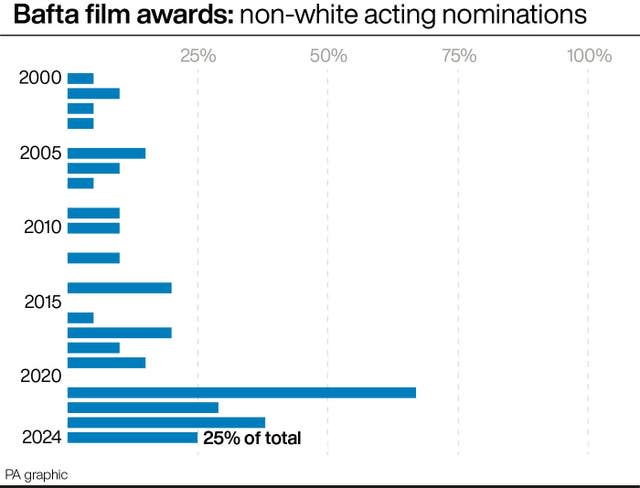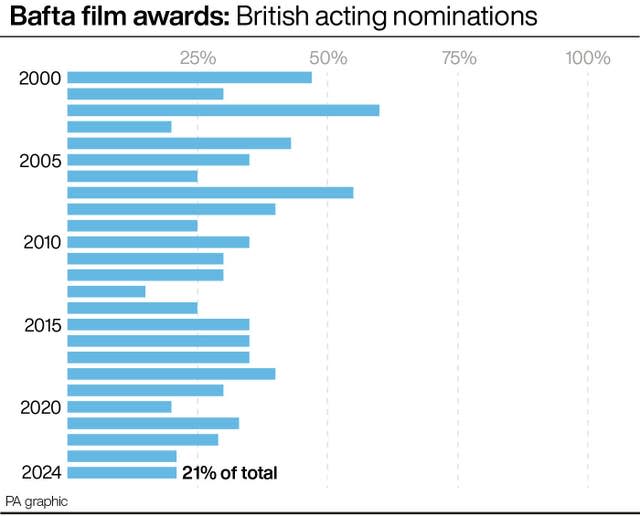Diversity and representation in the Bafta film nominations: Key numbers
The 2024 Bafta film nominations are not quite as diverse as in recent years, with levels of representation taking a step backwards in several categories.
A quarter (25%) of the acting nominations have gone to non-white performers, down from 38% last year and well below the record 67% in 2021.
Two of the six nominees in the best actor, best actress and best supporting actress categories are non-white.
No non-white performers have been nominated for best supporting actor.

Although the proportion of non-white nominees has fallen this year, it is still higher than the average since 2000 (13%) and is an improvement on the 2020 list, when every acting nominee was white.
In 2022, women made up half of the six nominees for best director, and in 2021 they outnumbered men by four to two.
This year, as in 2023, just one woman has been nominated: Justine Triet, for the film Anatomy of a Fall.
Female directors overlooked this year include Greta Gerwig (Barbie), Emerald Fennell (Saltburn) and Celine Song (Past Lives).
There have been only three female winners of the best director award in Bafta history: Kathryn Bigelow (for The Hurt Locker in 2010), Chloe Zhao (Nomadland in 2021) and Jane Campion (The Power Of The Dog in 2022).
No women have been nominated this year for best cinematography.
It follows two years in which there has been one female on the list: Mandy Walker in 2023 (Elvis) and Ari Wenger in 2022 (The Power Of The Dog).
A modest range of nationalities is represented across the 2024 acting nominations, with performers from Australia, Canada, Germany, Ireland and South Korea, along with the UK and United States.
Ireland gets three placings in the acting nominations: Cillian Murphy (Oppenheimer) and Barry Keoghan (Saltburn) in the best actor category, plus Paul Mescal (All of Us Strangers) for best supporting actor.
Actors from the UK make up just five of the 24 nominations, or 21%: the same proportion as last year, and one of the lowest on record.

The average since 2000 has been 33%.
In 2002, 60% of acting nominations went to British talent, and this remains the highest proportion so far this century.
No UK performers have been nominated for best actor – the first time this has happened since 2005.
There is also no UK representation in the best supporting actor category, though this is more common and last occurred in 2022.
The five UK acting nominees this year are Carey Mulligan (best actress, Maestro); Vivian Oparah (best actress, Rye Lane), Emily Blunt (best supporting actress, Oppenheimer); Claire Foy (best supporting actress, All of Us Strangers); and Rosamund Pike (best supporting actress, Saltburn).
Of the 23 people nominated across the 24 acting awards (Sandra Huller appears twice), 11 are first-time nominees, down from 14 in 2023, 19 in 2022 and 21 in 2021.

 Yahoo Movies
Yahoo Movies 
